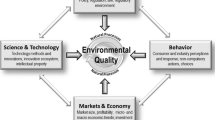Abstract
The specter of environmental calamity calls for the best efforts of an involved public. Ironically, the way people understand the issues all too often serves to discourage and frustrate rather than motivate them to action. This article draws from problem-solving perspectives offered by cognitive psychology and conflict management to examine a framework for thinking about environmental problems that promises to help rather than hinder efforts to address them.
Problem-framing emphasizes focusing on the problem definition. Since how one defines a problem determines one's understanding of and approach to that problem, being able to redefine or reframe a problem and to explore the “problem space” can help broaden the range of alternatives and solutions examined.
Problem-framing incorporates a cognitive perspective on how people respond to information. It explains why an emphasis on problem definition is not part of people's typical approach to problems. It recognizes the importance of structure and of having ways to organize that information on one's problem-solving effort. Finally, problem-framing draws on both cognitive psychology and conflict management for strategies to manage information and to create a problem-solving environment that not only encourages participation but can yield better approaches to our environmental problems.
Similar content being viewed by others
Literature cited
Alexander, C. 1965. The city is not a tree.Architectural Forum, 122:58–62.
Allman, W. 1985. Staying alive in the 20th century.Science85 October:3–41.
Bellman, H. S. 1980. Siting for a sanitary landfill for Eau Claire, Wisconsin.Environmental Professional 2(1):56–57.
Bingham, G. 1986. Resolving environmental disputes: A decade of experience. The Conservation Foundation. Washington, DC, 284 pp.
Brown, A. L., and J. S. De Loache. 1978. Skills plans and self-regulation. Pages 18–32in R. S. Siegler (ed.), Children's thinking: What develops? Lawrence Erlbaum and Associates, Hillsdale, New Jersey.
Carpenter, S., and W. J. D. Kennedy. 1985. Managing environmental conflict by applying common sense.Negotiation Journal 1(2):149–162.
Carroll, J. M. 1982. The adventure of getting to know a computer.Computer November:49–58.
Crowfoot, J. E., and J. M. Wondolleck 1990. Environmental disputes: Community involvement in conflict resolution. Island Press, Washington, DC, 275 pp.
De Groot, A. D. 1965. Thought and choice in chess. Mouton, The Hague, 463 pp.
De Young, R. 1984. Some psychological aspects of resource conservation: The role of intrinsic motivation in recycling. PhD dissertation. The University of Michigan, Ann Arbor, Michigan, 134 pp.
De Young, R., and S. Kaplan. 1988. On averting the tragedy of the commons.Environmental Management 12:273–283.
Dweck, C. S., and E. L. Leggett. 1988. A social-cognitive approach to motivation and personality.Psychological Review 95(2):256–273.
Ehrlich, P. 1980. An ecologist standing up among seated social scientists.The CoEvolution Quarterly Fall:24–35.
Elbow, P. 1981. Writing with power. Oxford University Press, New York, 384 pp.
Fischhoff, B. 1981. Hot air: The psychology of CO2-induced climatic change.In J. H. Harvey (ed.), Cognition, social behavior, and the environment. Lawrence Erlbaum Associates. Hillsdale, New Jersey.
Fisher, R., and W. Ury. 1981.Getting to yes: Negotiating agreement without giving in. Penguin Books, New York, 161 pp.
Freudenberg, K. 1984. Not in our backyards. Monthly Book Review Press, New York, 304 pp.
Garber, J., and M. Seligman. 1980. Human helplessness: Theory and applications. Academic Press, New York, 402 pp.
Hobson, T. 1989. Searching for success: Launching a nationwide campaign.The Renew America Report 3(3):1.
Interaction Associates. 1986. Conflict resolution in organizations. Handout from the third national conference in peacemaking and conflict resolution. June 1986, Denver, Colorado, 35 pp.
Kaplan, S., and R. Kaplan. 1982. Cognition and environment: Functioning in an uncertain world. Praeger, New York, 287 pp.
Lake, L. 1980. Environmental mediation: The search for consensus, Westview Press, Boulder, Colorado, 233 pp.
Lovins, A. B. 1977. Soft energy paths: Toward a durable peace. Ballinger Publishing, Cambridge, Massachusetts, 231 pp.
Maier, N. 1967. Assets and liabilities in group problem solving: The need for an integrative function.Psychological Review 74(4):239–249
Mandler, G. 1975. Memory storage and retrieval: Some limits on the research of attention and consciousness.in P. M. Rabbitt and S. Dornic (eds.)Attention and performance, vol. 5. Academic, London.
Mason, R., and I. Mitroff. 1981. Challenging strategic planning assumptions. John Wiley & Sons, New York, 324 pp.
Miller, G. A., E. Galanter, and K. H. Pilbram. 1960. Plans and the structure of behavior. Holt, Rinehalt and Winston, New York, 226 pp.
Odell, R. (ed.) 1982. Can science deal with environmental uncertainties?Conservation Foundation Letter January:1–7.
Posner, M. I. 1973. Cognition: An introduction. Scott Foresman, Glenview, Illinois, 208 pp.
Rappaport, J. 1986. In praise of paradox: A social policy of empowerment over prevention. Pages 141–164in E. Seidman and J. Rappaport (eds.) Redefining social problems. Plenum Press, New York.
Sampson, R. N., and D. Hair. 1990. Natural resources for the 21st century. Island Press, Washington, DC, 349 pp.
Schnaiberg, A. 1980. The environment: From surplus to scarcity. Oxford University Press, New York, 464 pp.
Simon, H. A. 1978. Rationality as process and as product of thought.American Economic Review 68: 1–16.
Straus, D. B. 1981. Managing complexity. Pages 1–9in P. A. Marcus and W. M. Emrich (eds.), Environmental conflict management: Working paper series. American Arbitration Association and Clark-McGlennon Associates, New York.
Talbot, A. R. 1983. Settling things: Six case studies in environmental mediation. The Conservation Foundation. Washington, DC, 45 pp.
Voss, J. F., S. W. Tyler, and L. A. Yengo, 1983. Individual differences in the solving of social science problems. Pages 205–232in R. F. Dillon and R. R. Schmeck (eds.), Individual differences in psychology, Academic Press, New York.
Watzlawick, P., T. Weaklind, and R. Fisch. 1974. Change: Principles of problem formation and problem resolution. W. W. Norton, New York, 172 pp.
Weick, K. 1984. Small wins: Redefining the scale of social problems,American Psychologist 39(1):40–49.
Williams, H. 1986. Barn-raising: An old approach helps old towns today.Small Town May/June:14–17.
Author information
Authors and Affiliations
Rights and permissions
About this article
Cite this article
Bardwell, L.V. Problem-Framing: A perspective on environmental problem-solving. Environmental Management 15, 603–612 (1991). https://doi.org/10.1007/BF02589620
Issue Date:
DOI: https://doi.org/10.1007/BF02589620




